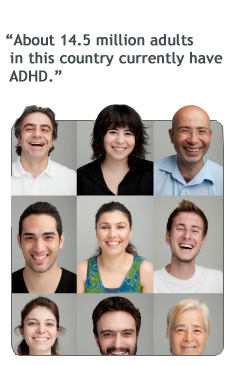 Marked by symptoms like inattention, hyperactivity and impulsiveness, Attention Deficit Hyperactivity Disorder (ADHD) is a well-known childhood developmental problem. However what happens when kids with ADHD aren’t youngsters any more, but are adults with careers and families? Do their symptoms disappear?
Unfortunately, people don’t "grow out of" ADHD as they reach adulthood, according to psychiatrist Eric Lewkowiez, M.D., assistant professor in Georgia Health Sciences University’s Department of Psychiatry and Behavioral Science. "Children do tend to grow out of hyperactivity. However this is replaced by restlessness and continued impulsivity and disorganization in adults," Dr. Lewkowiez tells Synergy.
The most recent census data reveals about 8 percent of children in the U.S. have ADHD and Dr. Lewkowiez says about two/thirds of them will go on to have the disorder as adults. In all, that adds up to about 14.5 million adults in this country who currently have ADHD.
 According to the National Institute of Mental Health, having ADHD isn’t linked to a lack of intelligence or talent – plenty of gifted people have the disorder. No matter how smart you are, if ADHD makes following directions, remembering dates, concentrating and organizing tasks or completing work difficult, it can obviously have an impact on your career and your personal life.
The good news is there are strategies to help you zero in on tasks, cope with distractions and be as organized as possible at home and on the job.
Could you have ADHD?Of course, most everyone feels overwhelmed, forgets an appointment, or finds it hard to concentrate sometimes. That doesn’t necessarily mean you have ADHD. However, if you have specific ongoing symptoms of the disorder, Dr. Lewkowiez, who is president-elect for the Georgia Council of Child and Adolescent Psychiatry, says it’s important to take them seriously. That’s because ignoring adult ADHD can have serious consequences.
"Adults with ADHD may have very poor decision making skills which lead to difficulty holding down jobs, financial problems, substance abuse, and difficulty maintaining relationships," he emphasizes.
For example, Dr. Lewkowiez points out that an adult with ADHD may say things without considering how this might impact the other person. They may forget important dates such as anniversaries or birthdays, miss important appointments, and interrupt and even monopolize conversations. Clearly, these are not behaviors that help careers or relationships.
If these problems sound familiar, where do you go for diagnosis and help?
 "That’s a very difficult question because a lot of adult psychiatrists are reluctant to diagnose ADHD and prescribe stimulant medications for fear that the patient may abuse those drugs. However, in fact, actual abuse of long acting-ADHD medications is greatly over-rated," explains Dr. Lewkowiez.
"A good place to start is with your primary care physician who is familiar with your medical history and resources in your community. I would recommend trying medication first, if possible, and working on improving organization and time management skills ."
Lifestyle strategiesAlthough over half of adults with ADHD respond well to medication, the rest don’t -- and some medication may not be appropriate for everyone with the condition due to potential side effects. However, once you understand you have the disorder, you can learn to manage symptoms with specific lifestyle strategies.
Tips for coping with ADHD at work:- Dr. Lewkowiez suggests using technology, such as a smartphone, to keep track of important appointments. Set your cell phone to ring or buzz in order to alert you to upcoming meetings.
- Make a list of things you need to accomplish for the day and check off tasks as they are completed.
- Carry a notepad with you at all times. If you think of something important or remember something you need to do, jot it down immediately.
- Try not to schedule meetings back-to-back, if you can. Leave yourself some time in between to prepare for events and gather your thoughts and any needed materials.
- Overwhelmed by a large task? Break it down into smaller projects and give each one a separate deadline.
ADHD at homeAll relationships have challenges and having a spouse or partner with ADHD can add to conflicts. The symptoms can put a strain on family relationships in several ways. For instance, a partner may constantly nag a spouse with ADHD to tidy up, listen more attentively, or be more organized. All of which can leave the person with ADHD resentful, hurt, and even angry.
With understanding, ADHD doesn’t have to harm or end a relationship. Simply receiving a diagnosis of the condition can be an enormous source of relief and hope to both partners in a relationship because it can explain the cause of sometimes-annoying and tension-causing problems like forgotten anniversaries and messy personal habits.
Psychotherapy, including cognitive behavioral therapy, can provide the adult with ADHD techniques to manage tasks at home and to identify ways to stay focused. For example, playing music may help some people stay on task while working on paying bills or completing household chore.
Dr. Lewkowiez urges partners of adults with ADHD to read as much as possible about the disorder. Learning about the condition instead of blaming a spouse with ADHD can go a long way to build patience and smooth problems on the homefront. Finding a support group for partners of people with ADHD can also be helpful.
|